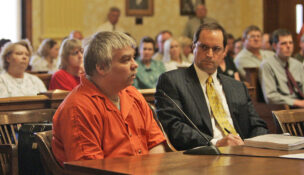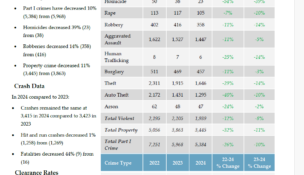State Supreme Court justices differ on what ‘theft’ means in Wisconsin
By: Michaela Paukner, [email protected]//November 27, 2019//
State Supreme Court justices differ on what ‘theft’ means in Wisconsin
By: Michaela Paukner, [email protected]//November 27, 2019//
The justices on the state Supreme Court aren’t in agreement on how Wisconsin law defines theft and noted their differences in an opinion issued on Friday in a case involving repeated retail theft at a Walmart in Green County.
Prosecutors alleged two women stole about $1,500 in merchandise from Walmart in seven instances of alleged theft. Court documents said one women pretended to scan merchandise at a self-checkout stand while the other pretended to help her and actually voided the items. The state charged them with one felony count of retail theft, rather than seven separate misdemeanor charges.
The defense argued the legal definition of theft pertains only to the five types of theft described in Wis. Stat. § 943.20. Those are: theft of movable property; theft of money, negotiable securities, instruments, paper or negotiable writings; theft of property from one with a superior interest; theft by fraud; and theft by failure to return property after the expiration of a lease or rental agreement.
The Green County Circuit Court concluded the statute didn’t include retail theft in its definition of theft, and the state couldn’t consolidate the individual instances of alleged theft into one felony charge. The appellate court reversed the decision, and the state Supreme Court affirmed that ruling on Friday.
The concurring justices differed on interpretations of some of the statutes regarding theft. A footnote in the opinion reads, “Justice Daniel Kelly joins this opinion except paragraphs 25 through 31. Curiously, while Justice Rebecca Grassl Bradley joins our mandate and seemingly agrees with at least a portion of the analysis, she nonetheless does not join any part of this opinion.”
The paragraphs talk about the statute titles, their meanings and their context.
In the dissenting opinion, Justices Ann Walsh Bradley and Rebecca Dallet said the legislature uses the word “theft” with a precise meaning. Bradley wrote “the majority/lead opinion ignores the precise meaning the legislature has afforded the term and instead broadly stretches its application.”
Legal News
- Steven Avery prosecutor Ken Kratz admits ‘mistakes were made’
- Colombian national extradited to Milwaukee faces International narcotics-trafficking conspiracy charge
- MPD: Milwaukee homicides down nearly 40 percent compared to last year
- EVERS: Republican lawmakers No-Show at special meeting to release statewide PFAS funding, stabilize healthcare access
- Wisconsin ICAC Task Force conference on Missing and Exploited Children highlights increase in sextortion cases
- More than 300 Wisconsin officers back in law enforcement after being fired or forced out
- Former Trump staffer who said to ‘fan the flame’ after 2020 loss hired to lead Wisconsin GOP
- Gov. Evers appoints David Casey to Serve as DOR Secretary
- Former Marine sentenced for Molotov Cocktail attack against Planned Parenthood Clinic
- ABA names 34th Annual Margaret Brent Women Lawyers of Achievement Awards honorees
- FBI launches criminal investigation into Key Bridge collapse
- Man charged in slaying after woman’s leg found at Milwaukee-area park
WLJ People
- Power 30 Personal Injury Attorneys – Russell Nicolet
- Power 30 Personal Injury Attorneys – Benjamin Nicolet
- Power 30 Personal Injury Attorneys – Dustin T. Woehl
- Power 30 Personal Injury Attorneys – Katherine Metzger
- Power 30 Personal Injury Attorneys – Joseph Ryan
- Power 30 Personal Injury Attorneys – James M. Ryan
- Power 30 Personal Injury Attorneys – Dana Wachs
- Power 30 Personal Injury Attorneys – Mark L. Thomsen
- Power 30 Personal Injury Attorneys – Matthew Lein
- Power 30 Personal Injury Attorneys – Jeffrey A. Pitman
- Power 30 Personal Injury Attorneys – William Pemberton
- Power 30 Personal Injury Attorneys – Howard S. Sicula











